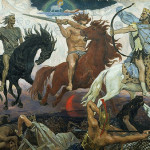We run our website the way we wished the whole internet worked: we provide high quality original content with no ads. We are funded solely by your direct support. Please consider supporting this project.

Jesus: Our Vision of God
At the beginning of his Gospel John taught that “no one has ever seen God, but the one and only Son, who is himself God and is in closest relationship with the Father, has made him known” (Jn 1:18). He is claiming that, outside of Christ, no one has ever truly known God.
In the preceding verse John contrasted the “grace and truth” that “came through Jesus Christ with “the law” that “was given through Moses” (Jn. 1:17). Taken together, these two verses suggest that people didn’t really know the truth about God through the law. The truth about God was disclosed only when God’s grace was revealed through the one and only Son, who is himself God.
Jesus is consistently presented as the only one who truly knows the Father and the only one through whom people can come to know the Father (Jn 17:3). Jesus is “the way and the truth and the life,” and “no one comes to the Father except through [him]” (Jn 14:6). The definite article before “way,” “truth” and “life” precludes any other ways to God, any other truths about God, and any other means of receiving life from God.
In this same passage Jesus immediately goes on to say, “If you really know me, you will know my Father was well. From now on, you do know him and have seen him” (Jn 14:7). Jesus was of course referring to himself as the personal revelation of the Father. His disciple Philip missed the point, however, for he went on to ask Jesus to “show us the Father” (14:8), to which Jesus makes the astonishing reply: “Don’t you know me, Philip…? Anyone who has seen me has seen the Father. How can you say, ‘Show us the Father’” (14:9)? Jesus was emphasizing the point that, if we want to know who the Father truly is—if we want to “see” him—we must not look to anyone other Jesus.
So close is the connection between the Father and the Son in the theology of John that anyone who knows the Son thereby knows the Father, while anyone who denies the Son thereby denies the Father as well (I Jn. 2:22-23). We cannot theoretically separate knowledge of the Father from our knowledge of the Son. So too, whoever honors the Son thereby honors the Father while whoever does not honor the Son does not honor the Father (Jn 5:23).
This intensely Christocentric focus is summed up in John’s teaching that Jesus is the eternal Word of God (Jn. 1:1). There has been much scholarly debate about what exactly the Greek term for “Word” (logos) entails, however, it at least entails that Jesus is God’s self-communication. The definite article is once again all-important. It is not that there are many “words” of God: there is one, and it is Jesus. As Poythress notes, John’s identification of Jesus as “the Word” implies that “all particular divine words, from the words of creation onward, are manifestations of the one eternal Word.”[1] If any words reveal God, therefore, it is only to the extent that they participate in and agree with God’s one and only Word, Jesus.
Similarly, John repeatedly describes Jesus as God’s light in the world (John 8:12). It’s not that there are many “lights” of God in the world: there is one, and it is Jesus. If anyone’s words shed light on who God truly is, therefore, it’s only to the extent that they participate in and agree with God’s one and only light, Jesus.
[1] Poythress, God Centered, 58.
Photo Credit: Riley McCullough via Unsplash
Category: General
Tags: Father, God, God's Character, Jesus, Word of God
Topics: Christology
Related Reading

Close Encounters of the Third (Kingdom) Kind: A Reflection on the Missio Alliance Conference
What an incredible gathering we had last week! It was invigorating, informative and fun! What stands out most to me was the family-feel of the conference. Like most of you, I have usually felt a bit alien when attending Christian conferences throughout the years. Not this one. You could sense the shared kingdom ethos in…

Imaging God Rightly: God’s Self-Portrait, Part 3
In the previous two blogs I noted that the vision of God in our minds is the single most important vision in our lives, for it completely determines whether we’ll have a relationship with God and what kind of relationship this will be. A. W. Tozer once wrote, “What comes into our minds when we…

Unpacking Revelation: Is it Literal?
According to many scholars as well as many Christian laypeople, the Jesus we find in the book of Revelation engages in a great deal of violence. This violence reaches a zenith in chapter 19 where we find Jesus going out to make war on a white horse (v. 11). He is dressed in a blood…

Does God Have a Dark Side?
In the previous post, I argued that we ought to allow the incarnate and crucified Christ to redefine God for us rather than assume we know God ahead of time and then attempt to superimpose this understanding of God onto Christ. When we do this, I’ve argued, we arrive at the understanding that the essence…

Featured Sermon Series: Scandalous Love
The Scandalous Love series is often considered one of Greg’s and Woodland Hill’s most foundational series. In fact, it was so important that it subsequently led to the Can’t Stop the Love series. Defining the true character of God is at the heart of what ReKnew is all about, so we wanted to host…

Parable of the Jerk Loser Son
Birmingham Museum and Art Gallery via Compfight Peter Enns blogged about the parable of the prodigal son, or as he likes to call it, “the parable of the jerk loser son.” It’s actually a reflection about the unbelievable and scandalous love of God. I guarantee it will bless you. From the article: The story isn’t about…
